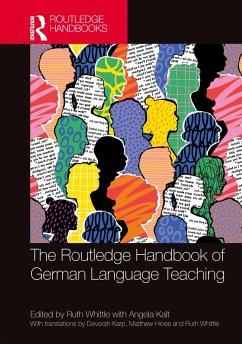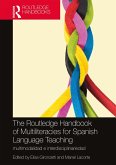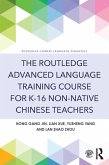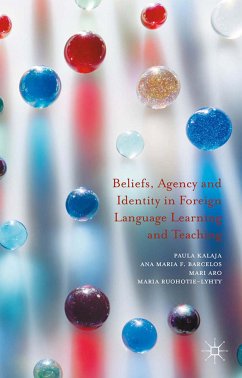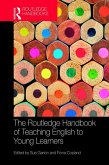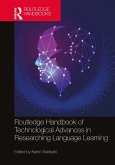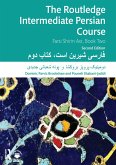The Routledge Handbook of German Language Teaching (eBook, PDF)
Redaktion: Whittle, Ruth
46,95 €
46,95 €
inkl. MwSt.
Sofort per Download lieferbar

23 °P sammeln
46,95 €
Als Download kaufen

46,95 €
inkl. MwSt.
Sofort per Download lieferbar

23 °P sammeln
Jetzt verschenken
Alle Infos zum eBook verschenken
46,95 €
inkl. MwSt.
Sofort per Download lieferbar
Alle Infos zum eBook verschenken

23 °P sammeln
The Routledge Handbook of German Language Teaching (eBook, PDF)
Redaktion: Whittle, Ruth
- Format: PDF
- Merkliste
- Auf die Merkliste
- Bewerten Bewerten
- Teilen
- Produkt teilen
- Produkterinnerung
- Produkterinnerung

Bitte loggen Sie sich zunächst in Ihr Kundenkonto ein oder registrieren Sie sich bei
bücher.de, um das eBook-Abo tolino select nutzen zu können.
Hier können Sie sich einloggen
Hier können Sie sich einloggen
Sie sind bereits eingeloggt. Klicken Sie auf 2. tolino select Abo, um fortzufahren.

Bitte loggen Sie sich zunächst in Ihr Kundenkonto ein oder registrieren Sie sich bei bücher.de, um das eBook-Abo tolino select nutzen zu können.
The Routledge Handbook of German Language Teaching evaluates and addresses multifaceted, multilevel needs of students and teachers within teaching German as a foreign, as well as a second, language through taking a transcultural approach.
- Geräte: PC
- mit Kopierschutz
- eBook Hilfe
Andere Kunden interessierten sich auch für
![The Routledge Handbook of Multiliteracies for Spanish Language Teaching (eBook, PDF) The Routledge Handbook of Multiliteracies for Spanish Language Teaching (eBook, PDF)]() The Routledge Handbook of Multiliteracies for Spanish Language Teaching (eBook, PDF)46,95 €
The Routledge Handbook of Multiliteracies for Spanish Language Teaching (eBook, PDF)46,95 €![The Routledge Advanced Language Training Course for K-16 Non-native Chinese Teachers (eBook, PDF) The Routledge Advanced Language Training Course for K-16 Non-native Chinese Teachers (eBook, PDF)]() Hong Gang JinThe Routledge Advanced Language Training Course for K-16 Non-native Chinese Teachers (eBook, PDF)33,95 €
Hong Gang JinThe Routledge Advanced Language Training Course for K-16 Non-native Chinese Teachers (eBook, PDF)33,95 €![The Routledge Handbook of the Sociopolitical Context of Language Learning (eBook, PDF) The Routledge Handbook of the Sociopolitical Context of Language Learning (eBook, PDF)]() The Routledge Handbook of the Sociopolitical Context of Language Learning (eBook, PDF)46,95 €
The Routledge Handbook of the Sociopolitical Context of Language Learning (eBook, PDF)46,95 €![Beliefs, Agency and Identity in Foreign Language Learning and Teaching (eBook, PDF) Beliefs, Agency and Identity in Foreign Language Learning and Teaching (eBook, PDF)]() Paula KalajaBeliefs, Agency and Identity in Foreign Language Learning and Teaching (eBook, PDF)105,95 €
Paula KalajaBeliefs, Agency and Identity in Foreign Language Learning and Teaching (eBook, PDF)105,95 €![The Routledge Handbook of Teaching English to Young Learners (eBook, PDF) The Routledge Handbook of Teaching English to Young Learners (eBook, PDF)]() The Routledge Handbook of Teaching English to Young Learners (eBook, PDF)47,95 €
The Routledge Handbook of Teaching English to Young Learners (eBook, PDF)47,95 €![Routledge Handbook of Technological Advances in Researching Language Learning (eBook, PDF) Routledge Handbook of Technological Advances in Researching Language Learning (eBook, PDF)]() Routledge Handbook of Technological Advances in Researching Language Learning (eBook, PDF)46,95 €
Routledge Handbook of Technological Advances in Researching Language Learning (eBook, PDF)46,95 €![The Routledge Intermediate Persian Course (eBook, PDF) The Routledge Intermediate Persian Course (eBook, PDF)]() Dominic Parviz BrookshawThe Routledge Intermediate Persian Course (eBook, PDF)49,95 €
Dominic Parviz BrookshawThe Routledge Intermediate Persian Course (eBook, PDF)49,95 €-
-
-
The Routledge Handbook of German Language Teaching evaluates and addresses multifaceted, multilevel needs of students and teachers within teaching German as a foreign, as well as a second, language through taking a transcultural approach.
Dieser Download kann aus rechtlichen Gründen nur mit Rechnungsadresse in A, B, BG, CY, CZ, D, DK, EW, E, FIN, F, GR, HR, H, IRL, I, LT, L, LR, M, NL, PL, P, R, S, SLO, SK ausgeliefert werden.
Produktdetails
- Produktdetails
- Verlag: Taylor & Francis eBooks
- Seitenzahl: 354
- Erscheinungstermin: 16. September 2024
- Englisch
- ISBN-13: 9781040114384
- Artikelnr.: 72274690
- Verlag: Taylor & Francis eBooks
- Seitenzahl: 354
- Erscheinungstermin: 16. September 2024
- Englisch
- ISBN-13: 9781040114384
- Artikelnr.: 72274690
- Herstellerkennzeichnung Die Herstellerinformationen sind derzeit nicht verfügbar.
Ruth Whittle is Associate Professor at the Department of Modern Languages, University of Birmingham, UK. Angela Kalt was a lecturer in Anglistik and Amerikanistik at the Katholische Universität Eichstätt-Ingolstadt, Germany.
List of Contributors
Preface
Part I: Overview
1. Contexts of Teaching German
2. Linguistic and Cultural Competency in Context
3. Communicating Across a Transcultural World: The Place(s) of Critical Terminology
4. The Question of Linguistic Identity in India
Part II: Opening the German-Language World to the Learner Through Working With Literature and Theatre
5. Interculturality and Mediation: Literature as an Object of Learning in DaF/DaZ
6. Language-Sensitive Literature Teaching
7. Intercultural Literature in Germany Since the 1960s from a DaF Perspective
8. Multilingual Theatre in the German Language and Culture Class: Inviting Larners to Eplore Fuid Identities
Part III: Opening the German-Language World to the Learner Through Working With Film and Song
9. Language Learning Through Music in a Super-Diverse Culture
10. The Role of Short Films in Cultural Studies in Teaching German as a Foreign Language (DaF)
Part IV: A Critical Evaluation of Language Learning - Some Teachers' Perspectives
11. Distance not Distant: Enriched, Enlivened Online Learning
12. A Critical Evaluation of the Digital Media Revolution in 2020/21
13. Inside the Classroom: Translating From and Into German
14. Developing Communication Skills Through Collaborative Learning in the German Language Classroom
15. A Voice and a Choice - Introducing Portfolio Assessment to German Courses at an Australian university
Part V: Difficult Histories in the German-Language Classroom
16. Exploring the Transnational in Teaching on the GDR in UK Higher Education
17. Teaching Germany's 1968: New Questions and Directions
Part VI: Teaching, Learning and Evaluation in the Transcultural Classroom
18. The Changing Space of Germany in Turkey
based on an interview with Kerstin Reichardt, conducted by Silke Henkele:
19. What Integration? Refugees and Their Teachers Battle with 'Integration'
based on an interview with Christiane Rösinger conducted by Silke Henkele, and with Claudia Hübner-Pitsela
20. Learning German as a Migrant in Austria: A Discussion of the Gap Between Research and Practice
21. Bridging the Gap: Fusing Language and Content Whilst Addressing Atudent Heterogeneity in Erasmus Courses at Potsdam University
22. The 'Native Speaker' Teacher: A Languages Professional in a Transcultural World
Index
Preface
Part I: Overview
1. Contexts of Teaching German
2. Linguistic and Cultural Competency in Context
3. Communicating Across a Transcultural World: The Place(s) of Critical Terminology
4. The Question of Linguistic Identity in India
Part II: Opening the German-Language World to the Learner Through Working With Literature and Theatre
5. Interculturality and Mediation: Literature as an Object of Learning in DaF/DaZ
6. Language-Sensitive Literature Teaching
7. Intercultural Literature in Germany Since the 1960s from a DaF Perspective
8. Multilingual Theatre in the German Language and Culture Class: Inviting Larners to Eplore Fuid Identities
Part III: Opening the German-Language World to the Learner Through Working With Film and Song
9. Language Learning Through Music in a Super-Diverse Culture
10. The Role of Short Films in Cultural Studies in Teaching German as a Foreign Language (DaF)
Part IV: A Critical Evaluation of Language Learning - Some Teachers' Perspectives
11. Distance not Distant: Enriched, Enlivened Online Learning
12. A Critical Evaluation of the Digital Media Revolution in 2020/21
13. Inside the Classroom: Translating From and Into German
14. Developing Communication Skills Through Collaborative Learning in the German Language Classroom
15. A Voice and a Choice - Introducing Portfolio Assessment to German Courses at an Australian university
Part V: Difficult Histories in the German-Language Classroom
16. Exploring the Transnational in Teaching on the GDR in UK Higher Education
17. Teaching Germany's 1968: New Questions and Directions
Part VI: Teaching, Learning and Evaluation in the Transcultural Classroom
18. The Changing Space of Germany in Turkey
based on an interview with Kerstin Reichardt, conducted by Silke Henkele:
19. What Integration? Refugees and Their Teachers Battle with 'Integration'
based on an interview with Christiane Rösinger conducted by Silke Henkele, and with Claudia Hübner-Pitsela
20. Learning German as a Migrant in Austria: A Discussion of the Gap Between Research and Practice
21. Bridging the Gap: Fusing Language and Content Whilst Addressing Atudent Heterogeneity in Erasmus Courses at Potsdam University
22. The 'Native Speaker' Teacher: A Languages Professional in a Transcultural World
Index
List of Contributors
Preface
Part I: Overview
1. Contexts of Teaching German
2. Linguistic and Cultural Competency in Context
3. Communicating Across a Transcultural World: The Place(s) of Critical Terminology
4. The Question of Linguistic Identity in India
Part II: Opening the German-Language World to the Learner Through Working With Literature and Theatre
5. Interculturality and Mediation: Literature as an Object of Learning in DaF/DaZ
6. Language-Sensitive Literature Teaching
7. Intercultural Literature in Germany Since the 1960s from a DaF Perspective
8. Multilingual Theatre in the German Language and Culture Class: Inviting Larners to Eplore Fuid Identities
Part III: Opening the German-Language World to the Learner Through Working With Film and Song
9. Language Learning Through Music in a Super-Diverse Culture
10. The Role of Short Films in Cultural Studies in Teaching German as a Foreign Language (DaF)
Part IV: A Critical Evaluation of Language Learning - Some Teachers' Perspectives
11. Distance not Distant: Enriched, Enlivened Online Learning
12. A Critical Evaluation of the Digital Media Revolution in 2020/21
13. Inside the Classroom: Translating From and Into German
14. Developing Communication Skills Through Collaborative Learning in the German Language Classroom
15. A Voice and a Choice - Introducing Portfolio Assessment to German Courses at an Australian university
Part V: Difficult Histories in the German-Language Classroom
16. Exploring the Transnational in Teaching on the GDR in UK Higher Education
17. Teaching Germany's 1968: New Questions and Directions
Part VI: Teaching, Learning and Evaluation in the Transcultural Classroom
18. The Changing Space of Germany in Turkey
based on an interview with Kerstin Reichardt, conducted by Silke Henkele:
19. What Integration? Refugees and Their Teachers Battle with 'Integration'
based on an interview with Christiane Rösinger conducted by Silke Henkele, and with Claudia Hübner-Pitsela
20. Learning German as a Migrant in Austria: A Discussion of the Gap Between Research and Practice
21. Bridging the Gap: Fusing Language and Content Whilst Addressing Atudent Heterogeneity in Erasmus Courses at Potsdam University
22. The 'Native Speaker' Teacher: A Languages Professional in a Transcultural World
Index
Preface
Part I: Overview
1. Contexts of Teaching German
2. Linguistic and Cultural Competency in Context
3. Communicating Across a Transcultural World: The Place(s) of Critical Terminology
4. The Question of Linguistic Identity in India
Part II: Opening the German-Language World to the Learner Through Working With Literature and Theatre
5. Interculturality and Mediation: Literature as an Object of Learning in DaF/DaZ
6. Language-Sensitive Literature Teaching
7. Intercultural Literature in Germany Since the 1960s from a DaF Perspective
8. Multilingual Theatre in the German Language and Culture Class: Inviting Larners to Eplore Fuid Identities
Part III: Opening the German-Language World to the Learner Through Working With Film and Song
9. Language Learning Through Music in a Super-Diverse Culture
10. The Role of Short Films in Cultural Studies in Teaching German as a Foreign Language (DaF)
Part IV: A Critical Evaluation of Language Learning - Some Teachers' Perspectives
11. Distance not Distant: Enriched, Enlivened Online Learning
12. A Critical Evaluation of the Digital Media Revolution in 2020/21
13. Inside the Classroom: Translating From and Into German
14. Developing Communication Skills Through Collaborative Learning in the German Language Classroom
15. A Voice and a Choice - Introducing Portfolio Assessment to German Courses at an Australian university
Part V: Difficult Histories in the German-Language Classroom
16. Exploring the Transnational in Teaching on the GDR in UK Higher Education
17. Teaching Germany's 1968: New Questions and Directions
Part VI: Teaching, Learning and Evaluation in the Transcultural Classroom
18. The Changing Space of Germany in Turkey
based on an interview with Kerstin Reichardt, conducted by Silke Henkele:
19. What Integration? Refugees and Their Teachers Battle with 'Integration'
based on an interview with Christiane Rösinger conducted by Silke Henkele, and with Claudia Hübner-Pitsela
20. Learning German as a Migrant in Austria: A Discussion of the Gap Between Research and Practice
21. Bridging the Gap: Fusing Language and Content Whilst Addressing Atudent Heterogeneity in Erasmus Courses at Potsdam University
22. The 'Native Speaker' Teacher: A Languages Professional in a Transcultural World
Index
